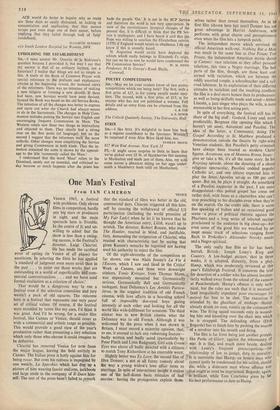UPHOLDING THE ESTABLISHMENT
must answer Mr. Quentin de-la Bedoyere's question because I provoked it, but may I say that my answer is that of an ordinary layman, not a historian? I realise that things are not so simple as this. A study of the Book of Common Prayer with special reference to the prefaces and explanatory articles at the beginning reveals the matured views of the reformers. There was no intention of making a new religion or forming a new church. If there had been, new Services would have been devised. Instead the Book was based on the old Service Books. The intention of all the changes was better to express and carry out what the Church had always meant to do in the Sacraments. The changes in Holy Com- munion includes putting the Service into English and encouraging frequent Communion in Mass. The Western rebels saw these two things as innovations and objected to them. They clearly had a strong case on the first point (of language), but on the second I suggest that the reformers were the more catholic. Other changes were simplifying the Service and giving Communion in both kinds. That the in- tention remained the same is shown by the append- age to the title 'commonly called the Mass.'
I understand that the word 'Mass' refers to the Dismissal, surely not an essential, and criticised to- day because so much happens after the priest has bade the people `Go.' It is not in the BCP Service and therefore the word is not very appropriate. In view of the revolutionary liturgical changes of the present day, it is difficult to think that the PB Ser- vice is inadequate, and I have heard it said that tile Pope was willing to sanction the Elizabethan version (1559) if England would return to obedience. I do not know if this is soundly based.
St. Augustine would surely have deplored the schism which really belongs to Elizabeth I's reign, but can we be so sure he would have condemned the
PB Communion Service? W. H. JONES Pendower, 34 St. George's Road, Hayle, Cornwall.






























 Previous page
Previous page